In 1964, Nelson Mandela was sentenced to life in prison over his calls for a colorblind South Africa. He ended up serving 27 years behind bars.
Hours after his release on Feb. 11, 1990, Mandela vowed to end apartheid once and for all, telling a roaring crowd: "Today, the majority of South Africans, black and white, recognize that apartheid has no future. It has to be ended by our decisive mass action. We have waited too long for our freedom."
Under Mandela's tutelage, apartheid was gradually dismantled over the next several years. It was a battle that he and his countrymen had fought immeasurably hard to win.
But though Mandela, who died this week at the age of 95, eventually won his fight, many around the world today continue to fight their own battles, risking their lives and their freedom to speak up against injustice.
Here, we share ten stories of political prisoners who are still suffering in jails around the world for standing tall in the face of repression.
Source: huffingtonpost.com
Author: Dominique Mosbergen
Hours after his release on Feb. 11, 1990, Mandela vowed to end apartheid once and for all, telling a roaring crowd: "Today, the majority of South Africans, black and white, recognize that apartheid has no future. It has to be ended by our decisive mass action. We have waited too long for our freedom."
Under Mandela's tutelage, apartheid was gradually dismantled over the next several years. It was a battle that he and his countrymen had fought immeasurably hard to win.
But though Mandela, who died this week at the age of 95, eventually won his fight, many around the world today continue to fight their own battles, risking their lives and their freedom to speak up against injustice.
Here, we share ten stories of political prisoners who are still suffering in jails around the world for standing tall in the face of repression.
-
Pussy Riot, Russia
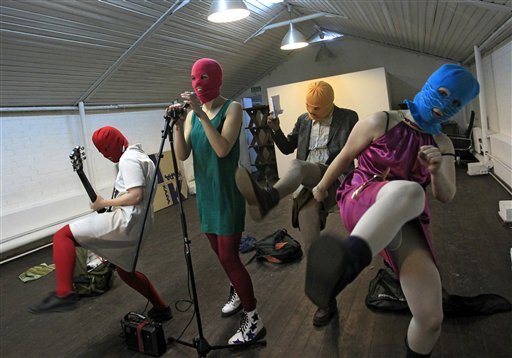 AP
Three members of the Russian punk rock group Pussy Riot, Maria Alyokhina, Yekaterina Samutsevich and Nadezhda Tolokonnikova, were arrested in March 2012 after the band put on a politically provocative performance at Moscow's main Orthodox cathedral. Donning colorful balaclavas, the young women danced in the altar of the church together with two other members of the band. They later used footage of the performance to create a music video for their protest song "Punk Prayer: Mother of God, Drive Putin Away."
AP
Three members of the Russian punk rock group Pussy Riot, Maria Alyokhina, Yekaterina Samutsevich and Nadezhda Tolokonnikova, were arrested in March 2012 after the band put on a politically provocative performance at Moscow's main Orthodox cathedral. Donning colorful balaclavas, the young women danced in the altar of the church together with two other members of the band. They later used footage of the performance to create a music video for their protest song "Punk Prayer: Mother of God, Drive Putin Away."
The three activists were arrested and put on trial for "hooliganism motivated by religious hatred." While Samutsevich was freed on appeal, Alyokhina and Tolokonnikova are currently serving two year sentences in prison. Amnesty International considers them "prisoners of conscience."
"I am not afraid of your poorly concealed fraud of a verdict in this so-called court because it can deprive me of my freedom," Alyokhina, 25, famously said in her closing statement during the trial, per Reuters. "No one will take my inner freedom away." -
Liu Xiaobo, China
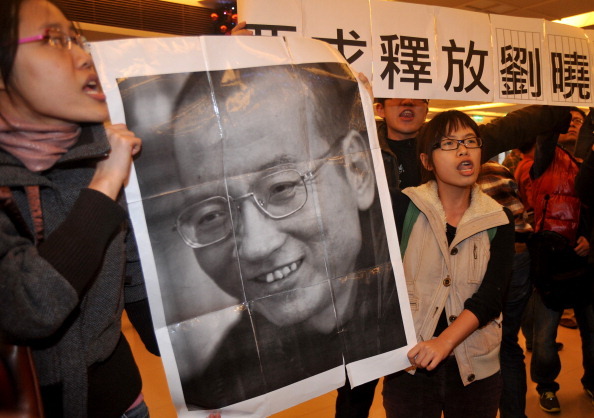 Patrick Lin/AFP/Getty Images
Literary critic, writer and long-time human rights activist Liu Xiaobo was detained by Chinese authorities in 2008. The arrest occured mere days before the publication of "Charter 08," a manifesto co-authored by Liu that called for democratic and human rights reforms in his native country.
Patrick Lin/AFP/Getty Images
Literary critic, writer and long-time human rights activist Liu Xiaobo was detained by Chinese authorities in 2008. The arrest occured mere days before the publication of "Charter 08," a manifesto co-authored by Liu that called for democratic and human rights reforms in his native country.
Eventually tried on suspicion of "inciting subversion of state power," Liu was sentenced to 11 years in prison in 2009. According to a recent post by the Economist, the activist "hasn't been heard from directly since."
Liu, who had been a vocal human rights advocate for decades and had taken part in the famous Tiananmen Square protests in 1989, was awarded the Nobel Peace Prize in 2010, much to the chagrin of Chinese leaders.
"I think this prize doesn't only belong to Liu Xiaobo one person, but also for all the people in China who advocate democracy, freedom and peace and for all the prisoners of conscience in jail," the Nobel Laureate's wife Liu Xia told Hong Kong's Cable TV at the time, per the AP. -
Eskinder Nega, Ethiopia
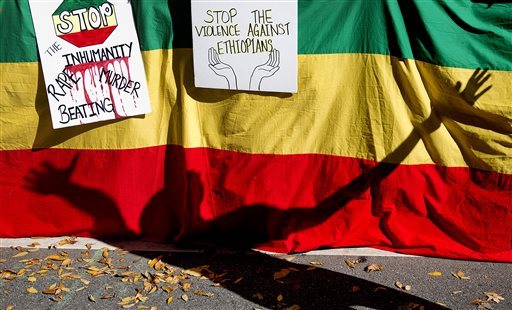 AP/David Goldman
Independent journalist Eskinder Nega is currently serving an 18-year sentence in his home country of Ethiopia on terrorism charges.
AP/David Goldman
Independent journalist Eskinder Nega is currently serving an 18-year sentence in his home country of Ethiopia on terrorism charges.
Nega was arrested in 2011 after publishing a column which criticized the Ethiopian government for misusing the 2009 Anti-Terrorism Proclamation to prosecute journalists and dissidents. Nega, who had been detained several times before for publishing articles that were critical of the government, was eventually tried and convicted under that very same law.
Five days before his arrest, Nega reportedly said: “Freedom is partial to no race. Freedom has no religion. Freedom favors no ethnicity. Freedom discriminates not between rich and poor countries. Inevitably freedom will overwhelm Ethiopia.” -
Father Thadeus Nguyen Van Ly, Vietnam
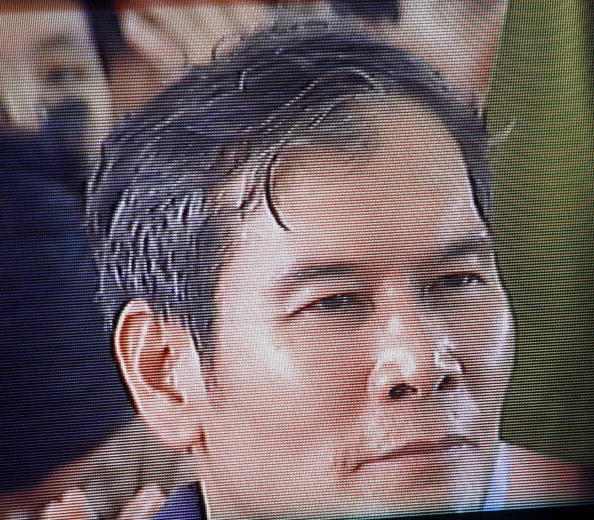 Hoang Dinh Nam/AFP/Getty Images
Vietnamese Catholic priest and pro-democracy dissident Father Thadeus Nguyen Van Ly has spent almost 20 years in prison since the 1970s for his vocal advocacy for freedom and democracy.
Hoang Dinh Nam/AFP/Getty Images
Vietnamese Catholic priest and pro-democracy dissident Father Thadeus Nguyen Van Ly has spent almost 20 years in prison since the 1970s for his vocal advocacy for freedom and democracy.
Father Ly was most recently arrested in 2007 for his involvement in the internet-based pro-democracy movement Bloc 8406. He was sentenced to eight years in jail.
According to Freedom Now, Father Ly was granted a "temporary suspension" of his prison sentence in 2010 after he suffered from several strokes while behind bars. Amnesty International reports that the father was held mainly in solitary confinement during his imprisonment and had suffered from several periods of ill-health before having a stroke. The organization said he "received neither a proper diagnosis nor adequate medical care."
Despite his fragile health, Father Ly, who has also been diagnosed with a brain tumor, was rearrested in July 2011 and remains in detention. -
David Ravelo, Colombia
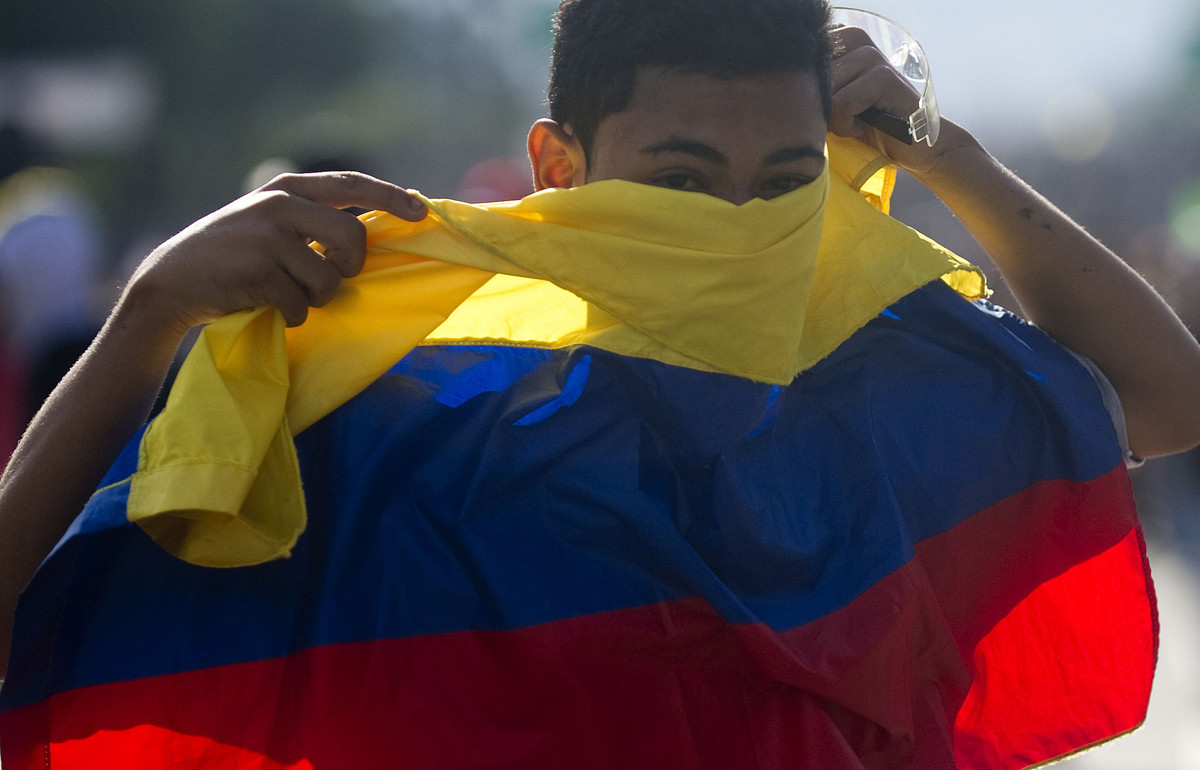 Raul Arboleda/AFP Photo/Getty Images
Prominent Colombian human rights activist and journalist David Ravelo is currently serving an 18-year sentence in a Bogota jail.
Raul Arboleda/AFP Photo/Getty Images
Prominent Colombian human rights activist and journalist David Ravelo is currently serving an 18-year sentence in a Bogota jail.
Ravelo was convicted of "aggravated homicide" in a 2012 trial which national and international human rights organizations have called bogus. It is believed that Ravelo, was put behind bars as retribution for speaking out on human rights violations in his country.
According to the International Federation for Human Rights, two United Nations representatives sent a communiqué to the Colombian government in 2011 expressing their concern that the “criminalization of David Ravelo occurs in the context of increasing prosecutions against human rights defenders in Colombia."
(In the photo above, an unidentified demonstrator covers his face with a Colombian flag during an August protest march in Medellin, Colombia.) -
Filep Karma, Indonesia
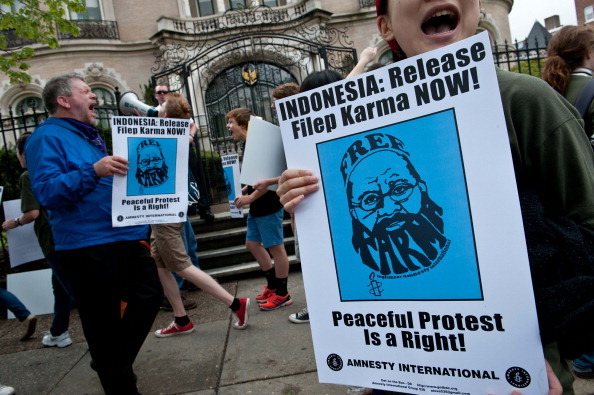 Nicholas Kamm/AFP/Getty Images
Filep Karma, an advocate for the rights of Indonesia's Papuan population, was reportedly arrested in 2004 for treason after he raised the banned Papuan Morning Star flag during a gathering that celebrated the anniversary of the 1961 Papuan declaration of independence from Dutch rule.
Nicholas Kamm/AFP/Getty Images
Filep Karma, an advocate for the rights of Indonesia's Papuan population, was reportedly arrested in 2004 for treason after he raised the banned Papuan Morning Star flag during a gathering that celebrated the anniversary of the 1961 Papuan declaration of independence from Dutch rule.
Amnesty International considers Karma "a prisoner of conscience." The organization says that reports indicate that the political activist may be suffering from serious health problems in prison and that he has been beaten by prison guards. -
Lolo, Tibet
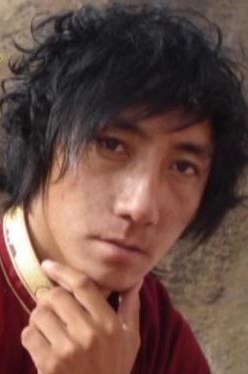 Free Tibet
Popular Tibetan musician Lolo was reportedly sentenced to six years in prison by Chinese authorities in February for recording an album of 14 songs that called for Tibet's independence.
Free Tibet
Popular Tibetan musician Lolo was reportedly sentenced to six years in prison by Chinese authorities in February for recording an album of 14 songs that called for Tibet's independence.
According to the non-profit Free Tibet, Lolo was likely "charged with 'splittism', a catch-all offense which allows the Chinese authorities to punish ethnic minorities defending their rights -- and which carries penalties up to and including execution."
"In the Western world, protest songs can get you a place in the charts: in Tibet, they land you in jail," said Eleanor Byrne-Rosengren, Free Tibet's director, in June. "Music is one of the few ways that Tibetans can preserve the culture that China has sought to destroy, and political songs represent a courageous form of resistance to repressive rule." -
Akzam Turgunov, Uzbekistan
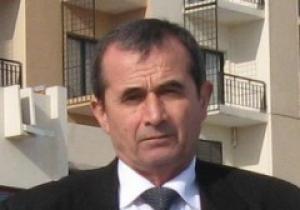 Frontline Defenders
In June, a group of 12 U.S. senators, including John McCain, Dick Durbin and Marco Rubio, called on President Islam Karimov of Uzbekistan to release three human rights defenders who they say have been unjustly incarcerated. Akzam Turgunov, a 61-year-old Uzbek human rights activist and political opposition leader, was one of the three political prisoners.
Frontline Defenders
In June, a group of 12 U.S. senators, including John McCain, Dick Durbin and Marco Rubio, called on President Islam Karimov of Uzbekistan to release three human rights defenders who they say have been unjustly incarcerated. Akzam Turgunov, a 61-year-old Uzbek human rights activist and political opposition leader, was one of the three political prisoners.
Human rights groups say that Turgunov has been wrongly detained in Uzbekistan since 2008. He is currently serving a 10-year prison sentence on charges of extortion.
According to the non-profit Freedom Now, Turgunov had been investigating corruption among local officials when he was arrested by officers at a police department that he had been scrutinizing. -
Abdulhadi al-Khawaja, Bahrain
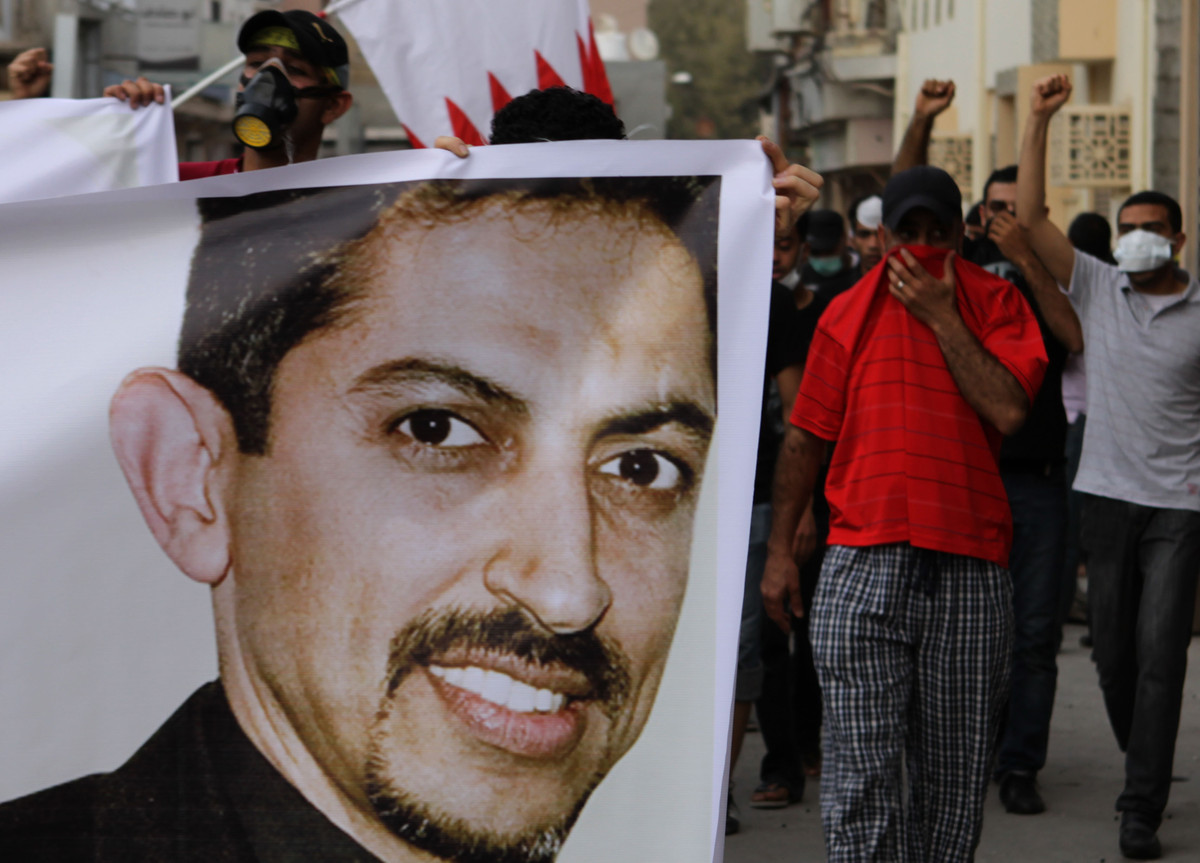 Hasan Jamali/AP
Considered the "father of Bahrain's human rights movement," Abdulhadi al-Khawaja is currently serving a life sentence in prison.
Hasan Jamali/AP
Considered the "father of Bahrain's human rights movement," Abdulhadi al-Khawaja is currently serving a life sentence in prison.
According to the non-profit Freedom House, which bestowed al-Khawaja with their annual Freedom Award in 2012, the long-time human rights defender was arrested and imprisoned following a series of pro-democracy uprisings in 2011.
Al-Khawaja, the co-founder of the Bahrain Center for Human Rights, has "endured numerous physical assaults, arrests, arbitrary detentions, and unjust trials as a result of his work," Freedom House says. The activist has reportedly been subject to torture while behind bars.
Last February, al-Khawaja embarked on what would become a 110 day hunger strike to protest his wrongful detention.
"If I die in the next 24 hrs, I ask the people to continue on the path of peaceful resistance," al-Khawaja, who was eventually force-fed by authorities, reportedly said in April 2012. "I don't want anybody to be hurt in my name." -
Agnes Uwimana Nkusi, Rwanda
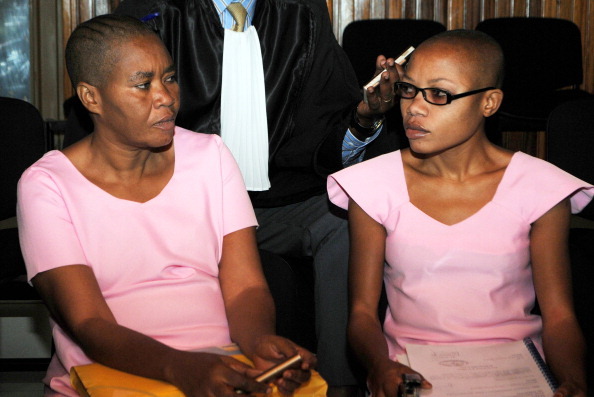 Steve Terrill/AFP/Getty Images
Rwandan journalist Agnes Uwimana Nkusi was sentenced to 17 years behind bars in 2011 for writing articles that opposed the Rwandan government, according to Reporters Without Borders.
Steve Terrill/AFP/Getty Images
Rwandan journalist Agnes Uwimana Nkusi was sentenced to 17 years behind bars in 2011 for writing articles that opposed the Rwandan government, according to Reporters Without Borders.
The then-editor of independent newspaper, Umurabyo, Uwimana and her co-worker Saidati Mukakibibi were charged with "inciting civil disobedience," among other charges, and imprisoned. (In the photograph above, both Mukakibibi (left) and Uwimana are pictured.)
Following the two journalists' convictions, Reporters Without Borders wrote that it was "appalled by the pigheadedness and cruelty of the Rwandan judicial system."
“Anyone who freely expresses an opinion or is critical of the authorities risks not only arrest but also a severe sentence,” the organization added.
According to Freedom Now, the Rwandan Supreme Court cleared Uwimana of some charges in 2012 and reduced her sentence to four years. However, she remains behind bars.
Mukakibibi was reportedly released in June after serving a three-year sentence.
Source: huffingtonpost.com
Author: Dominique Mosbergen

No comments:
Post a Comment